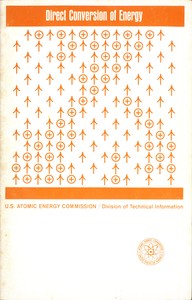Direct Conversion of Energy by William R. Corliss
"Direct Conversion of Energy" by William R. Corliss is a scientific publication written in the mid-20th century. This book discusses the various methods of directly converting different forms of energy into electrical power, focusing on advancements in technology related to nuclear energy. The likely topic of the book revolves around understanding and explaining the mechanisms of direct energy conversion processes, which are crucial in modern energy applications and space exploration. The content
of the book introduces key concepts such as thermoelectricity, thermionic conversion, magnetohydrodynamic conversion, and the role of chemical batteries and fuel cells. Corliss outlines the historical context of these technologies while highlighting their practical applications, especially in remote or space environments where reliability and maintenance-free operation are essential. He discusses the advantages of direct conversion systems over traditional dynamic converters, summarizing current research trends and future developments in energy technology. Overall, this work serves as an informative resource for those interested in the principles and future potential of energy conversion technologies. (This is an automatically generated summary.)
Read or download for free
| How to read | Url | Size | |||
|---|---|---|---|---|---|
| Read now! | https://www.gutenberg.org/ebooks/66033.html.images | 122 kB | |||
| EPUB3 (E-readers incl. Send-to-Kindle) | https://www.gutenberg.org/ebooks/66033.epub3.images | 1.5 MB | |||
| EPUB (older E-readers) | https://www.gutenberg.org/ebooks/66033.epub.images | 1.5 MB | |||
| EPUB (no images, older E-readers) | https://www.gutenberg.org/ebooks/66033.epub.noimages | 94 kB | |||
| Kindle | https://www.gutenberg.org/ebooks/66033.kf8.images | 1.6 MB | |||
| older Kindles | https://www.gutenberg.org/ebooks/66033.kindle.images | 1.6 MB | |||
| Plain Text UTF-8 | https://www.gutenberg.org/ebooks/66033.txt.utf-8 | 87 kB | |||
| Download HTML (zip) | https://www.gutenberg.org/cache/epub/66033/pg66033-h.zip | 1.4 MB | |||
| There may be more files related to this item. | |||||
Similar Books
About this eBook
| Author | Corliss, William R., 1926-2011 |
|---|---|
| Title | Direct Conversion of Energy |
| Original Publication | United States: U. S. Atomic Energy Commission, 1968. |
| Series Title | Understanding the atom. |
| Note | Reading ease score: 45.1 (College-level). Difficult to read. |
| Credits | Stephen Hutcheson and the Online Distributed Proofreading Team at https://www.pgdp.net |
| Language | English |
| LoC Class | TK: Technology: Electrical, Electronics and Nuclear engineering |
| Subject | Direct energy conversion |
| Category | Text |
| EBook-No. | 66033 |
| Release Date | Aug 11, 2021 |
| Copyright Status | Public domain in the USA. |
| Downloads | 167 downloads in the last 30 days. |
| Project Gutenberg eBooks are always free! | |


